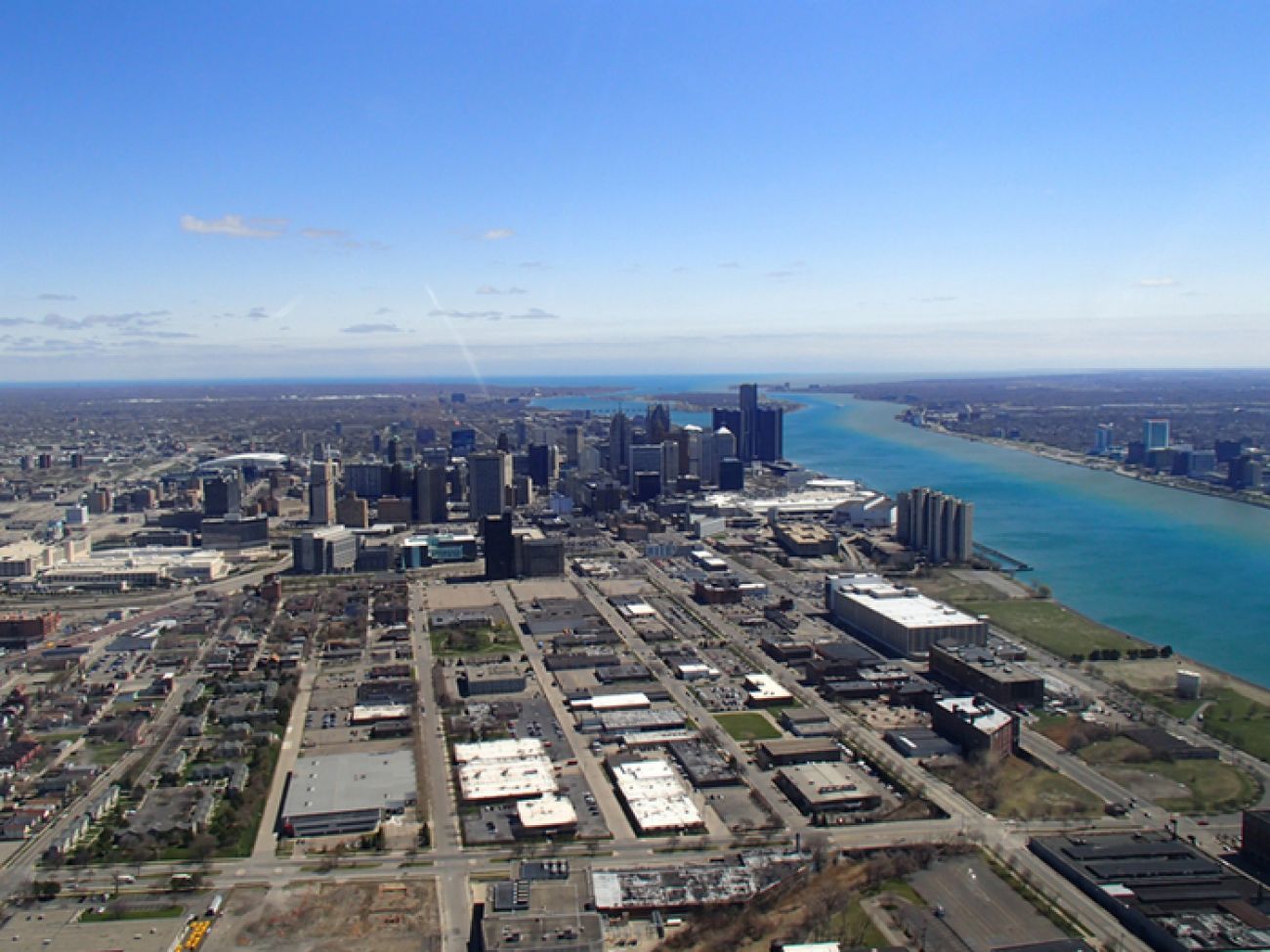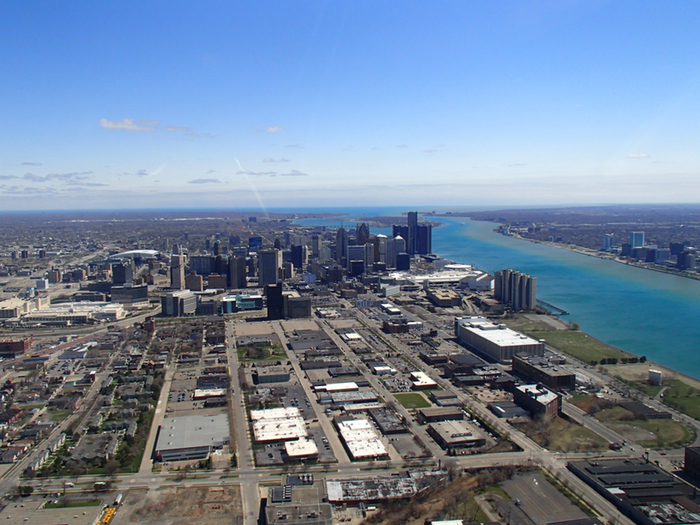State should send help to Detroit, Michigan voters say

Michigan voters, including Republicans and those who live far from bankrupt Detroit, want the state to provide financial support to its largest city as part of a “grand bargain,” according to a statewide poll.
What’s more, voters across the political spectrum said they would not hold a vote in support of Detroit financial aid against their own elected representatives.
The findings come as lawmakers in Lansing debate a $350 million funding package for Detroit that critics deride as unwise and unfair to other struggling Michigan communities. Emergency Manager Kevyn Orr is scheduled to testify Tuesday before the House Committee on Detroit's Recovery and Michigan's Future.
The EPIC-MRA poll, commissioned by the Detroit Journalism Cooperative, sought to measure how voters outside Detroit think about the city, and whether they back a state financial contribution to help Detroit’ emerge from the largest municipal bankruptcy in U.S. history.
Sixty-two percent of the 600 voters surveyed said they backed a proposal for the state to contribute $350 million to a so-called “grand bargain.” The plan would combine money from the state, several southeast Michigan foundations and the Detroit Institute of Arts to shield the museum’s art collection and minimize cuts to pensions of retired city workers.
A majority of voters across political lines said they would support such a deal – but only after they were given specific information on how the money would be spent in Detroit. The need for detail apparently reflected a lack of confidence in city leaders’ ability to spend this money wisely, given voters’ negative views on Detroit.
The survey was sponsored by the Detroit Journalism Cooperative, which includes Michigan Radio, WDET, Detroit Public Television, New Michigan Media, and Bridge Magazine, part of the Center for Michigan. Additional support was provided by Renaissance Journalism through a grant from the Ford Foundation.
The poll, conducted May 3-5, asked voters about two proposed options for helping Detroit escape from bankruptcy. The poll was taken before a proposal was introduced in Lansing late last week that combines elements of both options.
One option, first raised by Gov. Rick Snyder in January, would have the state pay Detroit $17.5 million a year for 20 years (a total of $350 million) from the state’s share of a national tobacco settlement. A second option, floated more recently by lawmakers, calls for the state to make a one-time, roughly $200 million payment to Detroit from the state’s estimated budget surplus this year.
Voters far preferred the 20-year plan from tobacco money. When asked to choose between the two, the option of paying a lump-sum from the budget surplus was chosen by fewer than 1-in-4 voters, whether they were Democrat, Republican or Independent.
Help sought, but with oversight
In Lansing last week, legislators unveiled a hybrid approach, calling for the state to provide $195 million in a lump sum from Michigan’s “rainy day” fund. Under this plan, the fund would be reimbursed over 20 years from tobacco settlement money. (The bills also would establish a seven-member financial oversight board that would remain in place for 20 years.)
Bernie Porn, president of EPIC-MRA, said the polling shows Michigan voters have little appetite for using taxpayer money to help Detroit, a sentiment that legislators apparently picked up on in introducing the proposal last week.
“It was probably a good approach to take,” Porn said. “Even though they would be using taxpayer money for the initial payment, Republicans can argue they are only doing this on a temporary basis and (the money) will be repaid over the years.”
Ari Adler, press secretary for House Speaker Jase Bolger, said popular support for lending a financial hand to Detroit isn’t surprising.
“Most people seem to understand that Detroit's successes and failures have been and will continue to impact success and failure for Michigan as a whole,” Adler said.
“It also is not surprising to hear that people would rather not see the budget surplus used to provide the state's portion of the proposed bankruptcy settlement. That is not something we have ever proposed, as any surplus was always discussed as a source of funding for individual relief – either in the form of a tax cut or as a base for increasing money available for roads and bridges. “
Rep. John Walsh, a Livonia Republican who sponsored several of the bills last week and is chairing the special committee on the Detroit aid package, said Michigan taxpayers deserve to know their money will be wisely invested.
“There’s still a lot of work to do,” Walsh said. “The balance here is very delicate. There’s an expectation from our taxpayers that there be some form of oversight. It has to be truly oversight, but not intrusive” on the ability of Detroit’s elected leaders to govern post-bankruptcy.
“Whenever I talk to (constituents), they want to make certain this will work,” Walsh said. “I can’t offer a guarantee, but we can offer oversight.”
Support for some version of aid was strongest among Democrats at 74 percent, but a majority of Republicans, 58 percent, also favored helping Detroit with money targeted for pensions and art. Independent voters were the weakest supporters of this targeted money, yet still reached a majority at 51 percent.
Regionally, support was strongest in Oakland County and the parts of Wayne County outside of Detroit, at 78 percent and 81 percent, respectively. Outstate approval stood at 56 percent, just above Macomb County, at 55 percent. Yet it was more difficult to get a clear fix on sentiment in some regions. While the statewide numbers carried a margin of error of plus or minus 4 percentage points, smaller regions of the state carried double-digit error margins.
Detroit support not a dealbreaker
Ever since Gov. Snyder and legislative leaders broached the idea of sending money to Detroit as part of a larger effort to help retirees and save art, there has been criticism from some lawmakers and conservative groups that the state would be throwing good money after bad. Opponents also note that there are communities across Michigan that are struggling with retiree legacy costs and other debt; and that sending millions to Detroit would set a precedent that Michigan would come to regret.
That has led to speculation that lawmakers who support a Detroit aid package this election year will be punished at the polls. The DJC survey suggests they have little to fear.
A majority of voters, 55 percent, said a vote to help Detroit would have no bearing on whether they would back that legislator in a future election. Another 27 percent said they would be more likely to vote for someone who backed Detroit aid, and 15 percent said it would make them less likely to vote for that legislator.
Porn, of EPIC-MRA, said this suggests Republican legislators need “not be worried about Tea Party opposition” or a primary challenge for their Detroit vote.
Bill Ballenger, associate editor of Inside Michigan Politics and longtime observer of Lansing, called the support for Detroit aid “mildly surprising.”
“You’d have to say it’s encouraging to anyone in favor of a bailout,” he said. “You wouldn’t think that support would be that high. It seems almost counterintuitive.”
What is this place called Detroit?
When it comes to the travails of its largest city, Michigan voters appear to view Detroit’s predicament like despairing family members confronting a trouble-plagued relative; one who’s dug a hole and fallen far: They may be difficult to deal with, but family is family.
The poll’s 600 voters – from all points in Michigan, excluding Detroit – hold paradoxical attitudes about Detroit. Fifty-eight percent said they had a negative attitude about the city, citing crime, blight and corrupt leadership for their opinions. Yet most had visited the city often, mostly for pleasure, and reported they’d had a positive experience there and would probably visit again. But 85 percent said they wouldn’t consider moving to the city, even if it improves post-bankruptcy. And 54 percent said they would disapprove of a child or close friend moving into Detroit.
One-third believe the city is “headed in the right direction,” and 28 percent described their impression of Detroit as positive. Those voters cite recent improvements in the city overall, specifically downtown, in government (34 percent approved of newly elected Mayor Mike Duggan’s administration so far) and in the city’s sports, business and cultural institutions.
For all their trepidation about Detroit, its safety and its future, the vast majority of Michigan voters agreed that Detroit’s recovery is important to the state’s economic health. This sentiment held across political lines whatever voters’ personal views on the city.
It’s a complicated mix, freely acknowledged by some voters who agreed to be interviewed.
“Detroit has always been in my life,” said Rick Ferguson, 42, of Lowell, just east of Grand Rapids. Growing up, he said, “I had an awe of Detroit, and to go through and see where it is now is so heartbreaking. I don’t know how else to put it. I cannot imagine being a citizen of Detroit and waking up and seeing more abandoned housing than occupied.”
Ferguson is a truck driver, and these days sees the city from the freeways as he drives through – he hasn’t stopped to visit in nearly a decade. Still, he wants to see the city recover. “I see Grand Rapids booming and it’s becoming more of a rival to Detroit,” he said. “I go to Ohio and see five great cities. Why can’t we have more than one or two?”
Those concerns were echoed by Paul Schleusener of Dimondale, in Eaton County, outside Lansing.
A Detroit recovery “would benefit the state as well,” said Schleusener, who said he generally votes Republican. “Michigan needs another thriving city. It benefits us all to have cities where people are having good lives.”
But, he added, it’s not all about economic development and money.
“I’m concerned for people,” said the father of six. Four of his children performed Christian charity work in Detroit. “I have met people who live in the area, and have friends there. That’s all part of the picture for me, too. I want to see good things happen there.”
Others expressed frustration with Detroit, and with the signal that would be sent if the city receives hundreds of millions of dollars in aid from Lansing.
“I’m very opposed to this,” said Greg Lonsberry, of Oscoda. “The people who control Detroit sat there so long” while the city’s problems mounted. “I feel they’re basically digging themselves into a deep hole.”
Lonsberry said other assets should be sold before the state contributes anything.
“They should have an auction of abandoned properties to raise money,” he said. But whatever happens, he added, “Detroit should be under a tight conservator rein” in the future.
Mike Wilkinson, Bridge’s computer-assisted reporting specialist, contributed graphics to this report.
See what new members are saying about why they donated to Bridge Michigan:
- “In order for this information to be accurate and unbiased it must be underwritten by its readers, not by special interests.” - Larry S.
- “Not many other media sources report on the topics Bridge does.” - Susan B.
- “Your journalism is outstanding and rare these days.” - Mark S.
If you want to ensure the future of nonpartisan, nonprofit Michigan journalism, please become a member today. You, too, will be asked why you donated and maybe we'll feature your quote next time!


 Michigan voters have a negative view of Detroit, but believe it’s in the state’s best interest to financially help the city. (Bridge photo by Sandra Svoboda)
Michigan voters have a negative view of Detroit, but believe it’s in the state’s best interest to financially help the city. (Bridge photo by Sandra Svoboda)